Storage Performance
SSD Testing
For our testing, the operating system is always installed to a Samsung 970 EVO NVMe based SSD. A second, identical drive is employed for testing RAID0 performance on motherboards that support this functionality natively, without PCIe adapter kits. In cases where this is necessary, an alternative is used as the OS drive. It is either an Intel SSD 750 via U.2 to PCIe adapter or a SATA based Samsung 840 Pro.
Standard SATA III 6Gb/s drive tests were performed using Western Digital Caviar Black WD1002FAEX hard drives on all SATA headers. The SATA drives were used for testing in RAID 0 64k block size configurations on all applicable controllers when possible. While not necessarily ideal, AMD controllers can’t use smaller block sizes.
For an apples to apples comparison, it is necessary to choose a common block size shared by both vendor’s controllers. Additionally, third party controllers from Marvell and Realtek should support this block size as well if necessary. All drive benchmarks were done using the freely available CrystalDiskMark program, run with both 50MB and 100MB sized test sets. NVMe drives use an additional 1000MB test set.
USB 2.0 Testing
To test the capabilities of the onboard USB 2.0 connections, we used a Sans Digital external eSATA / USB 2.0 drive enclosure, connected via the USB 2.0 port. Installed in the enclosure are dual Western Digital Caviar Black WD1002FAEX drives in a RAID0 configuration. In theory, this should always saturate the USB 2.0 connection an isolate the motherboard as the biggest variable in our USB 2.0 performance tests.
USB 3.x Testing
A Thermaltake BlacX 5G docking port which uses a USB 3.x connection with a SATA based Corsair Force GT SSD installed. While not the most modern drive, it is fast enough to test the USB connection.
Motherboard Storage Configuration
The X470 Gaming Pro has a simple storage configuration. It supports up to 6x SATA III 6Gb/s ports as well as two M.2 devices. One slot supports type 2280 devices while the other is capable of supporting the 110mm drives. There is no NVMe RAID support with this motherboard and as a result, no NVMe RAID tests were conducted. There isn’t much else to say as the SATA devices connect via the PCH while the M.2 devices are connected via the PCH and the CPU’s dedicated 4x PCIe Gen 3.0 lanes. In this case, the slot connected to the PCH was not tested.
50MB Test Set
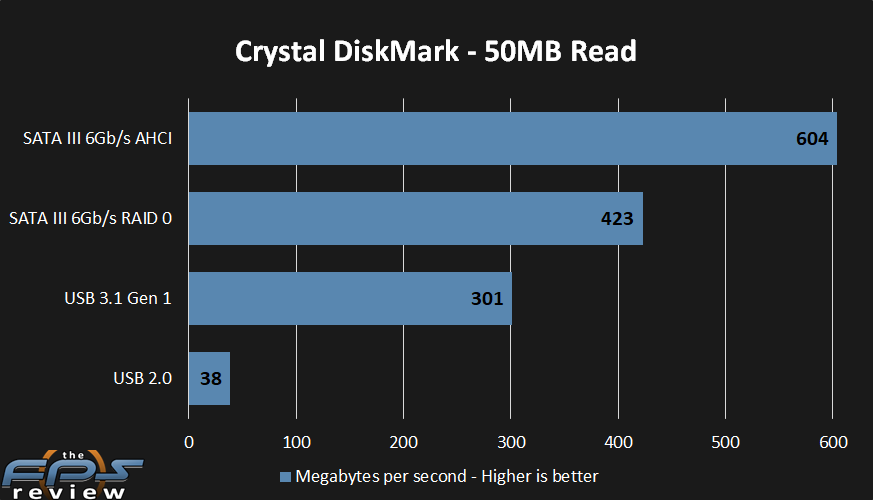
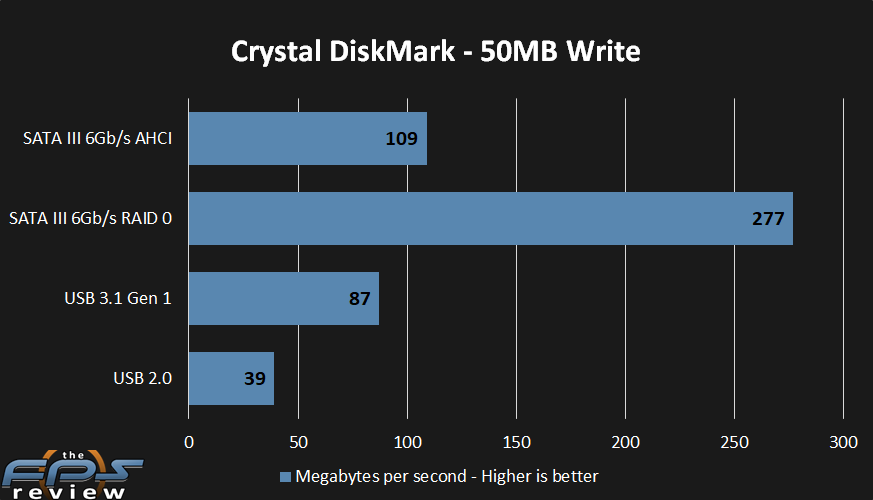
In the 50MB sequential read test, we saw a result of 604MB/s in the AHCI test and 423MB/s in the RAID 0 test. USB 2.0 and 3.1 achieved results of 39MB/s and 301MB/s respectively. In the 50MB sequential write test, we achieved a result of 122MB/s for the AHCI volume. In contrast, we saw a result of 255MB/s in the RAID 0 test. The USB 2.0 device came in at 39MB/s. USB 3.1 achieved a result of 87MB/s.
100MB Test Set
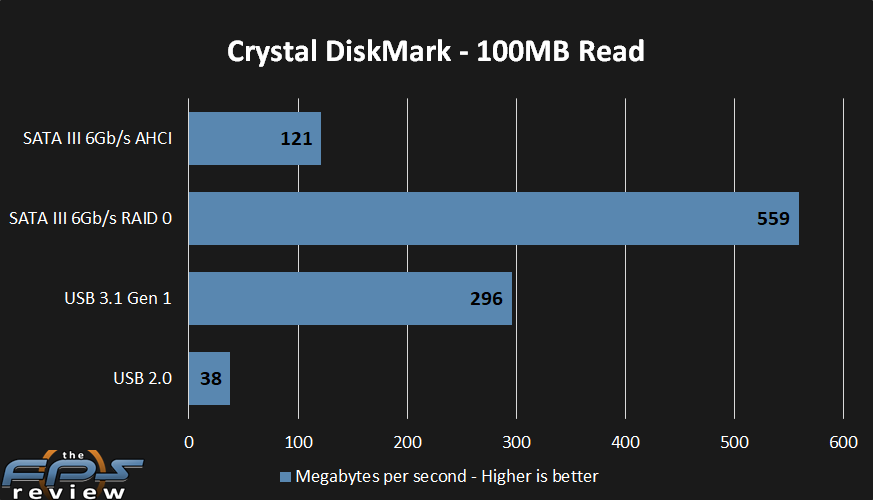
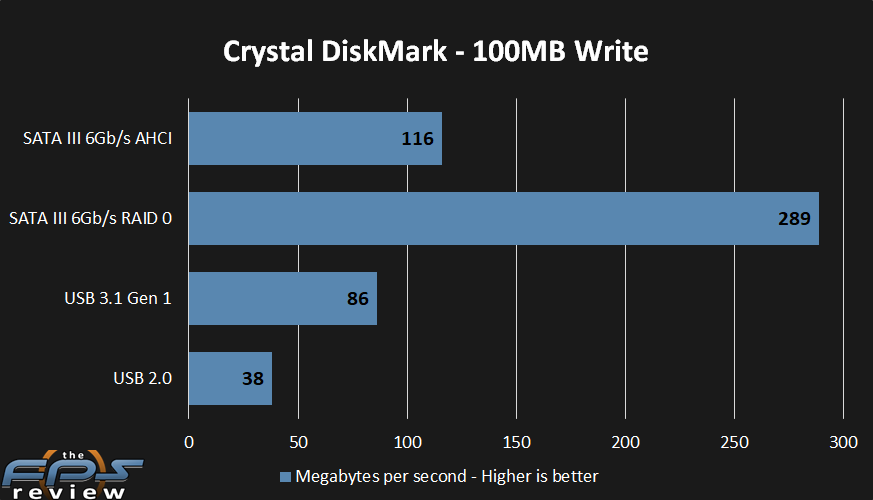
In the 100MB sequential read test, saw a score of 121MB/s using a single AHCI volume. Using a RAID 0 array, we saw a result of 559MB/s. For the USB 2.0 test, we saw a result of 38MB/s. In contrast, the USB 3.1 test achieved a result of 296MB/s. In the 100MB sequential read test, the AHCI configuration produced a result of 116MB/s compared to the RAID 0 configuration’s result of 289MB/s. USB 2.0 and 3.1 controllers scored 38MB/s and 86MB/s respectively.
M.2 NVMe Test Set
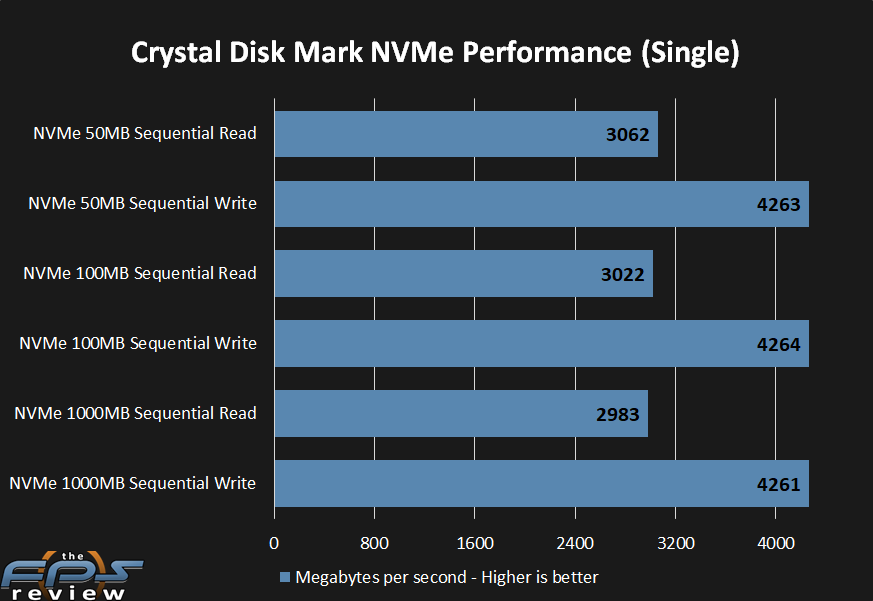
This is our first test using a PCIe Gen 4.0 SSD from Corsair. The model used was the Corsair Force MP600 with a 2.0TB capacity. This drive will be used on all PCIe 4.0 motherboards going forward to confirm PCIe Gen 4.0 capability on the motherboard. This is especially important where some motherboards may be questionable as far as PCIe Gen 4.0 signaling is concerned. Read test performance metrics were as follows: 3062MB/s (50MB), 3022MB/s (100MB), and 2983MB/s (1000MB). In the write tests, we saw the following performance results: 4263MB/s (50MB), 4264MB/s (100MB), and 4261MB/s (1000MB).
The results here are rather interesting. The read speeds are actually slower than those of our Samsung 970 EVO NVMe drives which are PCIe Gen 3.0. The Samsungs score about 500MB/s higher in the read tests. However, the write speeds are well over double the Samsungs. Those typically run about 1500MB/s here. So this drive appears to trade some read speed for more than twice the write speed of drives like the Samsung or the Corsair MP510.
